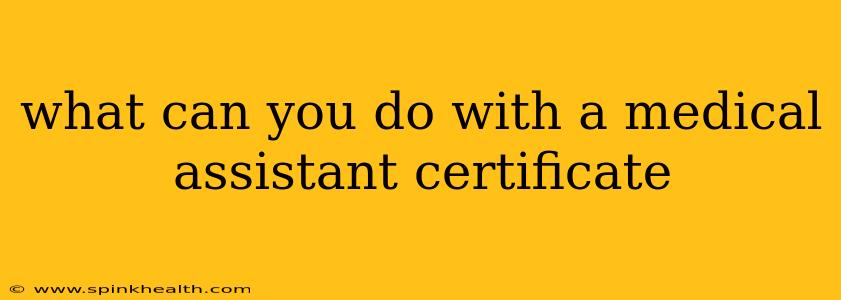What Can You Do with a Medical Assistant Certificate? A Journey into Healthcare Careers
The crisp paper in my hand felt weighty, a testament to months of late nights studying and countless hours of practical training. My medical assistant certificate—the culmination of hard work and dedication—opened a door to a world I’d only dreamed of. But what exactly could I do with it? The possibilities, it turned out, were far more expansive than I’d initially imagined. This isn't just a certificate; it's a key to a fulfilling career in a rapidly growing field.
My journey started with a simple question: what are the career paths available to a certified medical assistant? Let's explore some of the exciting avenues this certification unlocks.
What are the job duties of a medical assistant?
This was my first big question. The reality is, a medical assistant's daily tasks are incredibly varied and depend heavily on the specific practice or clinic. But some common threads weave through all the roles. I quickly learned that my responsibilities included:
- Clinical Tasks: Taking vital signs (temperature, blood pressure, heart rate), assisting with examinations, drawing blood, administering injections (under supervision), preparing patients for procedures, sterilizing instruments, and collecting and processing specimens. This hands-on aspect was precisely what drew me to this field.
- Administrative Tasks: Scheduling appointments, managing patient records (both paper and electronic), handling insurance claims, answering phones, greeting patients, and maintaining the overall organization of the clinic. This was surprisingly engaging, demanding a good eye for detail and organizational skills.
The balance between clinical and administrative tasks varies widely, offering flexibility to find a role that best suits your personality and skills.
What kind of salary can I expect as a medical assistant?
This is a question that resonates with everyone. The salary of a medical assistant depends on a number of factors, including location, experience, and employer. However, my research revealed that entry-level positions often offer a comfortable starting salary, with significant growth potential as you gain experience and specialized skills.
What are the different settings where I can work as a medical assistant?
The beauty of this certification is its versatility. I wasn't limited to one setting. My certificate opened doors to a range of healthcare environments, including:
- Physician's Offices: This was the most common path for many of my classmates, offering a stable and varied work environment.
- Clinics: From general practice clinics to specialized clinics (cardiology, dermatology, etc.), there was a world of options.
- Hospitals: Hospitals offered a broader spectrum of tasks and the chance to work in various departments.
- Nursing Homes and Assisted Living Facilities: Providing care for the elderly in these settings appealed to many of my compassionate classmates.
The choice really depended on personal preferences and career goals.
What are the opportunities for advancement?
My journey didn't end with the certificate. It was a springboard to further growth and specialization. I learned about several career paths I could pursue:
- Becoming a Certified Medical Coder/Biller: This path focused on the administrative side, which I found equally interesting.
- Pursuing further education to become a Registered Nurse (RN) or Physician Assistant (PA): The MA certificate proved to be an excellent stepping stone to higher education and more advanced roles.
- Specializing in a specific area of medicine: I could focus on cardiology, pediatrics, or other fields that sparked my interest.
The options for growth were inspiring.
What are some certifications beyond the medical assistant certificate?
Continuing education wasn't just about career advancement; it was about keeping my skills sharp and relevant. I investigated different certifications, such as:
- Certified Clinical Medical Assistant (CCMA): This offered a higher level of clinical proficiency.
- Registered Medical Assistant (RMA): Another highly regarded credential.
These certifications further enhance my marketability and potential earning power.
My medical assistant certificate wasn't just a piece of paper; it was a passport to a rewarding career. It provided a strong foundation in healthcare, opening up a world of opportunities, and continues to empower my professional growth. The possibilities are truly vast, and the journey is just beginning.

